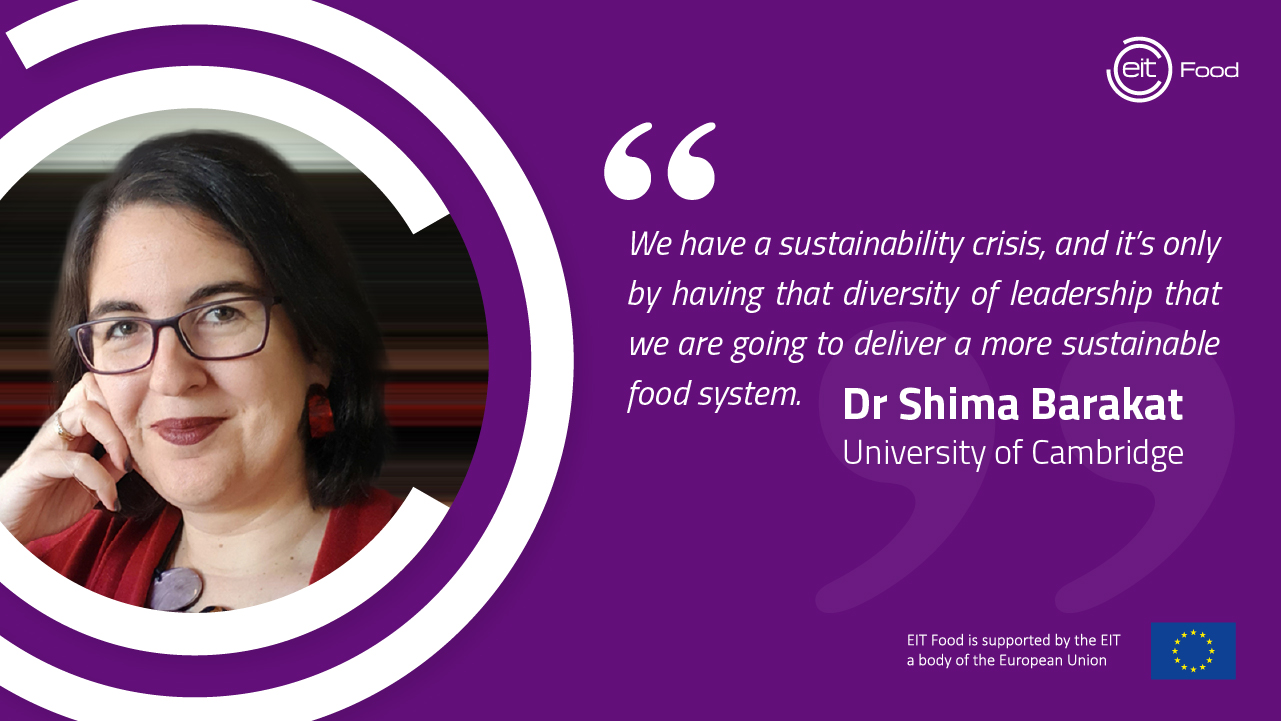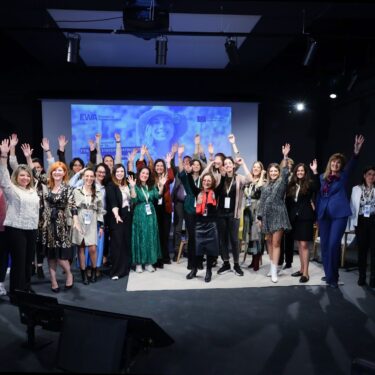The women innovators transforming the food system
We are in the midst of a sustainability crisis: it is well recognised that the social and environmental impacts of today’s food production are unsustainable. We need to change the way we do things, creating sustainable, healthy food systems. But who will lead this revolution? The answer does not lie in the tried and tested systems of the past - it lies in a more disruptive, entrepreneurial approach, led by a more diverse cast of actors.
EIT Food is supporting the women leading this disruption and encouraging others to rise up to the challenge. We need innovation, we need change, and ultimately, we need to transform the food sector.
Celebrating the women innovators of the past

From left to right: Margaret Knight, Dorothy Hodgkin and Elsie Widdowson
We think it’s important to recognise and celebrate the success of early female entrepreneurs in the food sector. These women were trailblazers who have paved the way for generations of women to drive innovation.
You may not have heard of the following inspirational women, but it’s a pretty good bet you are familiar with the impact of their work.
Margaret Knight - invented the modern-day grocery bag
Margaret Knight had a real passion for problem solving. Working in a paper bag factory in Massachusetts after the American civil war, she was struck by the idea that paper bags would be much easier to pack things into if the bottoms were flat. She created a machine which automatically folded and glued paper-bag bottoms, and the results of this invention are still used widely in grocery stores today, as well as across a wide number of other sectors.
Elsie Widdowson - pioneer of nutrition
The British dietitian and nutritionist Elsie Widdowson investigated ways to ensure that people received the nutrition they needed to stay healthy during chronic food shortages. This research became the basis for the development of rationing policies during the Second World War. She became President of the British Nutrition Foundation and received numerous honours such as election to a Fellowship of the Royal Society in 1976 and the title of Companion of Honour in 1993.
Dorothy Hodgkin - improving the understanding of diabetes
British chemist Dorothy Hodgkin significantly contributed to unravelling the secrets of diabetes. In 1964, she was awarded the Nobel Prize in Chemistry for discovering the structure of vitamin B-12. She also worked on the structure of insulin for over 30 years, eventually publishing the initial structure in 1969, which has greatly increased our understanding of diabetes. Throughout her career, she acted as an ambassador for diabetes awareness, collaborating with other scientists and and travelling the world giving talks about insulin and its importance for diabetes.
Today’s women innovators
This entrepreneurial spirit is still driving impact and women continue to take leading roles as successful innovators in the food sector. We are actively empowering female innovators within our community and taking inspiration from those we work closely with in the sector to shine a light on women who are leading the fight for a more sustainable food system.
A balanced workforce
In the food sector, the percentage of women in management positions can be anywhere between 9-25%, depending on which part of the food chain you are looking at. Research has shown that gender-balanced teams are linked to higher performance, and are more likely to employ sustainable practices. If we are committed to creating a more sustainable food system then surely we need to address this imbalance?
Programmes such as WE Lead, an EIT Food initiative creating a network of women leaders who wish to drive change, innovation and sustainability within the food sector, enable us to start this process of addressing the imbalance. Project Lead Dr Shima Barakat sees a future where top management teams and founding teams have a gender balance around the 50:50 mark: "We have a sustainability crisis, and it's only by having that diversity of leadership that we are going to deliver a more sustainable food system"

Cleaning up food waste
With an estimated third of food wasted globally, tackling food waste is a huge part of making the food system sustainable. One way of doing this is through circular economy, which eliminates waste through the continual use and reuse of resources - could there be value in food waste?
Linda Grieder is founder and CEO of RethinkResource, an EIT Food RisingFoodStar startup who are actively turning industrial side and waste streams into sustainable and profitable business opportunities.
“We are fighting for the future of food by eliminating waste and valorising sidestreams. We want everyone to perceive waste as valuable material thus finding new applications in different industries.”
– Linda Grieder, CEO of RethinkResource
RethinkResource has developed their ‘Circado’ trading platform, which matches industrial buyers and sellers of side streams, essentially allowing them to reuse each other’s ‘waste’.
Surplus food materials have value in terms of money, but also in terms of nutrition. “We try to eliminate the word ‘waste’ because we want to see the value, we want to recognise that value and we don’t want to call it ‘waste’ because in waste there is probably no high value” explains Linda Grieder.
Linda Grieder explains how her startup RethinkResource is aiming to create value from waste
Well over half of all food wastage happens in the home. Tessa Clarke is CEO & Founder of Olio, whose motto is ‘Share more. Waste less’, and is building a more sustainable future by reducing food waste: “I was brought up on a farm so I know how much hard work goes into producing our food, as a result of that I absolutely hate the idea of throwing perfectly good food in the bin.”
Olio is a free app, which connects people to share food within their communities, essentially saving it from the bin. To date, over 1,700,000 people have joined the Food Sharing App, over 3,000,000 portions of food have been shared, and almost 9,500,000 equivalent car miles saved.
Listen to Tessa Clarke on The Food Fight Podcast as she explains how her food sharing app Olio is reducing food waste in communities
Feeding the world
The world’s population is set to rise to 9.8 billion by 2050. More people mean more food, and so we need to think about sustainable ways of producing this. A part of this will include looking for sustainable sources of protein - an important macronutrient in our diet.
Animal products have traditionally been a major dietary source of protein, but with animal production being a major contributor to greenhouse gas emissions, reducing the amount of animal products we eat, whilst increasing the amount of protein we are able to produce, will be a big challenge.
Magdalena Kozłowska is CEO and Founder of NapiFeryn Biotech, a Polish startup who are pioneering new forms of environmentally-friendly alternative proteins in order to feed humanity: “Today’s children will inherit a planet which will be degraded, out of resources like land or water. The way we eat and what we eat is no longer our private matter…"
Explore how the startup Napiferyn is creating sustainable protein from rapeseed
And she’s right, what we eat has a big impact on the environment and we will need to supply much more food in the coming years to feed our growing global population. The protein NapiFeryn are producing comes from a sidestream produced during rapeseed oil production. Rapeseed is grown all across Europe, so the proteins are from locally sourced crop, and can be used as ingredients in a number of foods. NapiFeryn are part of the EIT Food RisingFoodStars Association and are currently looking to scale-up their technology and licence it all over the world.
Listen to Magdalena describe NapiFeryn in this Food Fight Spotlight podcast episode.
A bright future
International women’s day is a yearly opportunity to put a spotlight on inspirational women innovating to transform the food system, but what is being done on a day-to-day basis to support this?
“Transforming the food system and promoting gender inclusivity go hand-in-hand. At EIT Food we believe women entrepreneurs are critical to innovation in the agrifood sector and supporting them will help us to build a more sustainable food system.”
- Charlotte Knowles, Chief Operating Officer at EIT Food and a strong advocate of supporting women entrepreneurs.
EIT Food has identified gender inclusivity as a strategic priority meaning all its projects have to consider how to address equality issues in its funding proposals. Another platform for addressing this is through EIT Food’s Changemakers programme, which supports entrepreneurs currently underrepresented in the agrifood startup space. The programme has a current focus on women innovators, providing support to enable them to launch their ideas, identify role models and mentors and connect with the agrifood community. Programmes such as WE Lead and Hungry Shepreneurs are also helping to support women by creating a network of women leaders who wish to drive change, innovation and sustainability within the food sector.
Solving the challenges facing women entrepreneurs in the agrifood sector with EIT Food’s Hungry Shepreneurs programme
Calling all women entrepreneurs looking to transform the food system!
We currently have programmes actively seeking applications for women entrepreneurs looking to make a difference in the food system:
- The EIT Food WE Lead programme: this leading programme offers early and mid-career researchers and professional women an opportunity to explore and develop both their entrepreneurial and leadership self, address systemic issues, define their vision for a more sustainable food system, and devise a plan for the change each one wants to drive. If you’re interested please sign up now!
- Building entrepreneurial capacities for women in the agrifood business: The objective of this programme is to encourage a stronger level of enterprise development for women entrepreneurs from countries with modest to moderate levels of innovation (RIS). The programme will run for a period of 6 months supporting early-stage female entrepreneurs, especially those living in rural areas, though dedicated, online mentoring, face-to-face training and participation in top networking events. Interested? Get involved now!
More blog posts

Protein Diversification Think Tank BLOG

Farming in Europe: the changing landscape of food production







